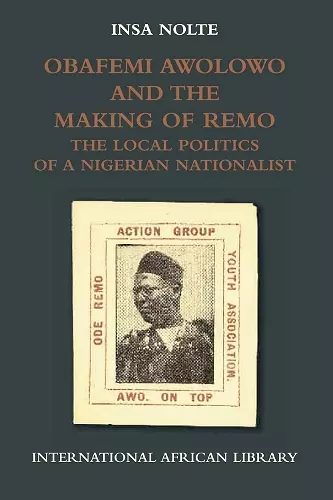Obafemi Awolowo and the Making of Remo
The Local Politics of a Nigerian Nationalist
Format:Hardback
Publisher:Edinburgh University Press
Published:15th Jun '09
Currently unavailable, and unfortunately no date known when it will be back

This book examines the evolution of a distinctive Yoruba community, Remo, and the central role played in this process by the Remo-born Nationalist and Yoruba leader Obafemi Awolowo (1909-87). Since the Nineteenth Century, popular participation has played an important role in challenging or confirming local hierarchies in Remo. This historical dynamic had a significant impact on Awolowo's vision both for Yoruba and Nigerian politics. When he moved into national politics in the 1950s, his career at the national level also gave him the opportunity to shape Remo's political identity. Awolowo was both a product and a producer of Remo politics. Based on a subtle analysis of local-level politics, this book argues that traditional and modern participatory structures play an important role both in Yoruba politics and in the African postcolonial state. At the same time, its focus on Awolowo makes an important contribution to the scholarly debate on one of Nigeria's most important politicians.
This admirable and richly textured book should be widely read not only by those interested in Yoruba history and modern Nigeria but by all those who seek a mature understanding of the intricate connections between local and national politics. Nolte provides powerful insights on the towering stature of Chief Obafemi Awolowo, the preeminent politician of the era, along with the social dimensions of power, the richness of political networks, institutional conflicts, the construction of mythologies of power and popular loyalty, and many more crucial topics, all ably analyzed with clarity and precision. -- Toyin Falola, The Frances Higginbotham Nalle Centennial Professor in History, University of Texas at Austin This is one of the most important books in Nigerian Studies in the last decade. It is thoroughly researched, lucidly analytical, and impressive in scope and depth. This book will establish Nolte's place as an important scholar of Nigerian and Yoruba Studies. -- Olufemi Vaughan, Geoffrey Canada Professor of History & Africana Studies, Bowdoin College, Brunswick Nolte's theme is the quest for political participation and consensus in the Nigerian Yoruba town of Remo. Shadowing this tale is the life of Remo's most distinguished son, the Nigerian statesman Obafemi Awolowo. Nolte provides a fascinating tapestry of Remo life, as well as the single best portrait available of Awolowo's background and personality. Gratifyingly detailed but clearly presented, Nolte's book is rich and rewarding. In sum, this is a model study of Africa's past and present and it proclaims the arrival of a scholar of formidable gifts. -- T.C. McCaskie, Professor of the History of Africa, School of Oriental and African Studies, London One of the most important contributions of this book is the way in which the author not only (conceptually) emphasises but also (empirically) demonstrates the everyday-ness of political and cultural legitimacy in late colonial and post-colonial Africa... By historicising and spelling out ideology in a local milieu as politico-cultural guide in the daily practices of social actors, Nolte instructs that the discourse of democracy must begin to contend more with the 'wider ranges of social routines ' that define political life in Africa. -- Wale Adebanwi - JMAS A short review cannot do justice to this work's richness in historical detail and analytical scope. The book speaks to many current concerns and will be required reading for historians working on Nigeria. -- Dmitri Van Den Bersselaar Journal of African History This admirable and richly textured book should be widely read not only by those interested in Yoruba history and modern Nigeria but by all those who seek a mature understanding of the intricate connections between local and national politics. Nolte provides powerful insights on the towering stature of Chief Obafemi Awolowo, the preeminent politician of the era, along with the social dimensions of power, the richness of political networks, institutional conflicts, the construction of mythologies of power and popular loyalty, and many more crucial topics, all ably analyzed with clarity and precision. This is one of the most important books in Nigerian Studies in the last decade. It is thoroughly researched, lucidly analytical, and impressive in scope and depth. This book will establish Nolte's place as an important scholar of Nigerian and Yoruba Studies. Nolte's theme is the quest for political participation and consensus in the Nigerian Yoruba town of Remo. Shadowing this tale is the life of Remo's most distinguished son, the Nigerian statesman Obafemi Awolowo. Nolte provides a fascinating tapestry of Remo life, as well as the single best portrait available of Awolowo's background and personality. Gratifyingly detailed but clearly presented, Nolte's book is rich and rewarding. In sum, this is a model study of Africa's past and present and it proclaims the arrival of a scholar of formidable gifts. One of the most important contributions of this book is the way in which the author not only (conceptually) emphasises but also (empirically) demonstrates the everyday-ness of political and cultural legitimacy in late colonial and post-colonial Africa... By historicising and spelling out ideology in a local milieu as politico-cultural guide in the daily practices of social actors, Nolte instructs that the discourse of democracy must begin to contend more with the 'wider ranges of social routines ' that define political life in Africa. A short review cannot do justice to this work's richness in historical detail and analytical scope. The book speaks to many current concerns and will be required reading for historians working on Nigeria.
ISBN: 9780748638956
Dimensions: unknown
Weight: 640g
336 pages